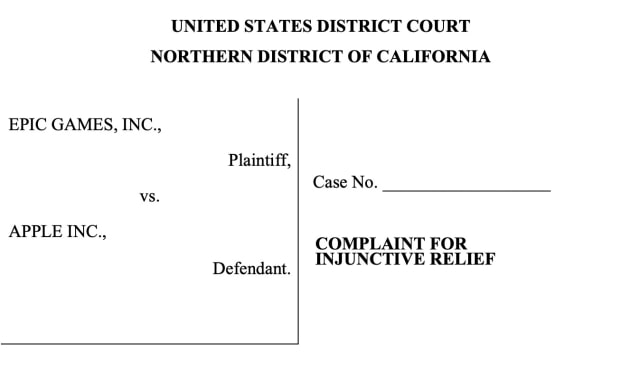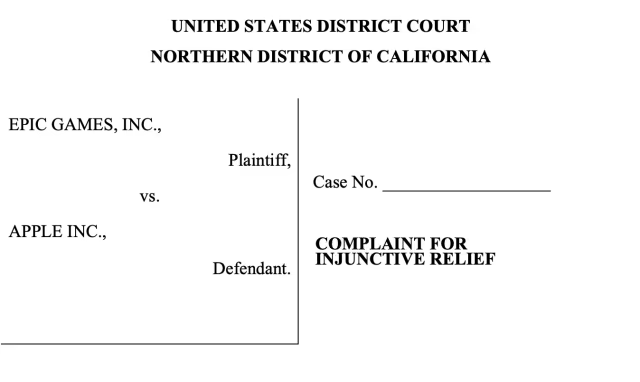Epic Games has filed a lawsuit against Apple accusing the company of anti-competitive restraints and monopolistic practices.
In a filing with the United States District Court for the Northern District of California, Epic Games says "Apple has become what it once railed against: the behemoth seeking to control markets, block competition, and stifle innovation. Apple is bigger, more powerful, more entrenched, and more pernicious than the monopolists of yesteryear. At a market cap of nearly $2 trillion, Apple’s size and reach far exceeds that of any technology monopolist in history."
The lawsuit comes after Epic Games attempted to offer its Fortnite players the option to purchase V-Bucks and real-money directly at a 20% discount. This payment method wouldn't allow Apple to collect a 30% cut. Fortnite was promptly removed from the App Store. Clearly, Epic Games expected this outcome and had its lawsuit ready.


Here are some highlights from the complaint:
-----
Epic brings this suit to end Apple’s unfair and anti-competitive actions that Apple undertakes to unlawfully maintain its monopoly in two distinct, multibillion dollar markets: (i) the iOS App Distribution Market, and (ii) the iOS In-App Payment Processing Market (each as defined below). Epic is not seeking monetary compensation from this Court for the injuries it has suffered. Nor is Epic seeking favorable treatment for itself, a single company. Instead, Epic is seeking injunctive relief to allow fair competition in these two key markets that directly affect hundreds of millions of consumers and tens of thousands, if not more, of third-party app developers.
Apple imposes unreasonable restraints and unlawfully maintains a total monopoly in the iOS App Distribution Market. To live up to its promise to users that “there’s an app for that”, Apple, after a short initial attempt to go it alone, opened up iOS and invited third-party app developers to develop a wide array of apps for the iOS ecosystem. Those apps contribute immense value to that ecosystem and are one of the primary marketing features for iPhones and iPads. But Apple completely bans innovation in a central part of this ecosystem, namely, any app that could compete with Apple for the distribution of apps in iOS. Through its control over iOS, and through a variety of unlawful contractual restrictions that it forces app developers to accept, Apple prevents iOS users from downloading any apps from any source other than Apple’s own storefront, the App Store.
The result is that developers are prevented from selling or distributing iOS apps unless they use Apple’s App Store, and accede to Apple’s oppressive terms and conditions for doing so (some of which are discussed further below). For example, as the sole distributor of iOS apps, Apple collects the money from every iOS user’s app purchase, remits only 70% of that payment to the app developer, and retains a 30% tax for itself. iOS developers are thus forced to increase the prices they charge consumers in order to pay Apple’s app tax. There is no method app developers can use to avoid this tax, as Apple has foreclosed any alternative ways to reach the over one billion users of iOS devices. As Representative Hank Johnson aptly summed up at a recent Congressional hearing on technology monopolies: “developers have no choice but to go along with [Apple’s policies] or they must leave the App Store. That’s an enormous amount of power.”
------
Notably, the complaint already addresses today's events:
-----
On the morning of August 13, 2020, for the first time, Apple mobile device users were offered competitive choice. Epic added a direct payment option to Fortnite, giving players the option to continue making purchases using Apple’s payment processor or to use Epic’s direct payment system. Fortnite users on iOS, for the first time, had a competitive alternative to Apple’s payment solution, which in turn enabled Epic to pass along its cost savings by offering its users a 20% reduction in in-app prices as shown below:
Rather than tolerate this healthy competition and compete on the merits of its offering, Apple responded by removing Fortnite from sale on the App Store, which means that new users cannot download the app, and users who have already downloaded prior versions of the app from the App Store cannot update it to the latest version. This also means that Fortnite players who downloaded their app from the App Store will not receive updates to Fortnite through the App Store, either automatically or by searching the App Store for the update. Apple’s removal of Fortnite is yet another example of Apple flexing its enormous power in order to impose unreasonable restraints and unlawfully maintain its 100% monopoly over the iOS In-App Payment Processing Market.
-----
Apple has yet to respond to the lawsuit. Please download the iClarified app or follow iClarified on Twitter, Facebook, YouTube, and RSS for updates and let us know what you think in the comments!
Hit the link below to read the full complaint.
Read More
In a filing with the United States District Court for the Northern District of California, Epic Games says "Apple has become what it once railed against: the behemoth seeking to control markets, block competition, and stifle innovation. Apple is bigger, more powerful, more entrenched, and more pernicious than the monopolists of yesteryear. At a market cap of nearly $2 trillion, Apple’s size and reach far exceeds that of any technology monopolist in history."
The lawsuit comes after Epic Games attempted to offer its Fortnite players the option to purchase V-Bucks and real-money directly at a 20% discount. This payment method wouldn't allow Apple to collect a 30% cut. Fortnite was promptly removed from the App Store. Clearly, Epic Games expected this outcome and had its lawsuit ready.


Here are some highlights from the complaint:
-----
Epic brings this suit to end Apple’s unfair and anti-competitive actions that Apple undertakes to unlawfully maintain its monopoly in two distinct, multibillion dollar markets: (i) the iOS App Distribution Market, and (ii) the iOS In-App Payment Processing Market (each as defined below). Epic is not seeking monetary compensation from this Court for the injuries it has suffered. Nor is Epic seeking favorable treatment for itself, a single company. Instead, Epic is seeking injunctive relief to allow fair competition in these two key markets that directly affect hundreds of millions of consumers and tens of thousands, if not more, of third-party app developers.
Apple imposes unreasonable restraints and unlawfully maintains a total monopoly in the iOS App Distribution Market. To live up to its promise to users that “there’s an app for that”, Apple, after a short initial attempt to go it alone, opened up iOS and invited third-party app developers to develop a wide array of apps for the iOS ecosystem. Those apps contribute immense value to that ecosystem and are one of the primary marketing features for iPhones and iPads. But Apple completely bans innovation in a central part of this ecosystem, namely, any app that could compete with Apple for the distribution of apps in iOS. Through its control over iOS, and through a variety of unlawful contractual restrictions that it forces app developers to accept, Apple prevents iOS users from downloading any apps from any source other than Apple’s own storefront, the App Store.
The result is that developers are prevented from selling or distributing iOS apps unless they use Apple’s App Store, and accede to Apple’s oppressive terms and conditions for doing so (some of which are discussed further below). For example, as the sole distributor of iOS apps, Apple collects the money from every iOS user’s app purchase, remits only 70% of that payment to the app developer, and retains a 30% tax for itself. iOS developers are thus forced to increase the prices they charge consumers in order to pay Apple’s app tax. There is no method app developers can use to avoid this tax, as Apple has foreclosed any alternative ways to reach the over one billion users of iOS devices. As Representative Hank Johnson aptly summed up at a recent Congressional hearing on technology monopolies: “developers have no choice but to go along with [Apple’s policies] or they must leave the App Store. That’s an enormous amount of power.”
------
Notably, the complaint already addresses today's events:
-----
On the morning of August 13, 2020, for the first time, Apple mobile device users were offered competitive choice. Epic added a direct payment option to Fortnite, giving players the option to continue making purchases using Apple’s payment processor or to use Epic’s direct payment system. Fortnite users on iOS, for the first time, had a competitive alternative to Apple’s payment solution, which in turn enabled Epic to pass along its cost savings by offering its users a 20% reduction in in-app prices as shown below:
Rather than tolerate this healthy competition and compete on the merits of its offering, Apple responded by removing Fortnite from sale on the App Store, which means that new users cannot download the app, and users who have already downloaded prior versions of the app from the App Store cannot update it to the latest version. This also means that Fortnite players who downloaded their app from the App Store will not receive updates to Fortnite through the App Store, either automatically or by searching the App Store for the update. Apple’s removal of Fortnite is yet another example of Apple flexing its enormous power in order to impose unreasonable restraints and unlawfully maintain its 100% monopoly over the iOS In-App Payment Processing Market.
-----
Apple has yet to respond to the lawsuit. Please download the iClarified app or follow iClarified on Twitter, Facebook, YouTube, and RSS for updates and let us know what you think in the comments!
Hit the link below to read the full complaint.
Read More

